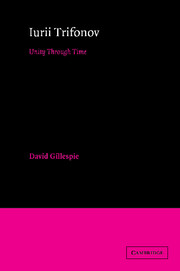Book contents
- Frontmatter
- Contents
- Preface
- Introduction
- 1 From Moscow students to the Turkmenian desert (Studenty; Utolenie zhazhdy)
- 2 Moscow life, 1966–1975 (Obmen; Predvaritel'nye itogi; Beskonechnye igry; Dolgoe proshchanie; Drugaia zhizn')
- 3 The house on the embankment (Dom na naberezhnoi)
- 4 Terrorism, Civil War and the present (Neterpenie; Otblesk kostra; Starik)
- 5 Time and place (Vremia i mesto; Ischeznovenie)
- Conclusion: unity through dislocation (Oprokinutyi dom)
- Notes
- Bibliography
- Index
- CAMBRIDGE STUDIES IN RUSSIAN LITERATURE
1 - From Moscow students to the Turkmenian desert (Studenty; Utolenie zhazhdy)
Published online by Cambridge University Press: 22 August 2009
- Frontmatter
- Contents
- Preface
- Introduction
- 1 From Moscow students to the Turkmenian desert (Studenty; Utolenie zhazhdy)
- 2 Moscow life, 1966–1975 (Obmen; Predvaritel'nye itogi; Beskonechnye igry; Dolgoe proshchanie; Drugaia zhizn')
- 3 The house on the embankment (Dom na naberezhnoi)
- 4 Terrorism, Civil War and the present (Neterpenie; Otblesk kostra; Starik)
- 5 Time and place (Vremia i mesto; Ischeznovenie)
- Conclusion: unity through dislocation (Oprokinutyi dom)
- Notes
- Bibliography
- Index
- CAMBRIDGE STUDIES IN RUSSIAN LITERATURE
Summary
Studenty is separated by thirteen years from Trifonov's second novel, Utolenie zhazhdy. Though the period of time between the two novels is considerable, and the attitudes that set them apart even more marked, they have one thing in common. In this the early phase of his career Trifonov was following the traditions of socialist realist writing, and writing to order. Under Stalin writers were required to portray the life of society in a one-sided and artificially optimistic manner. Under Khrushchev writers were expected to support the policy of ‘de-Stalinization’ by rebelling against such schematization, and by affirming the emergence of a ‘new’, more humane morality.
Studenty is very much based on Trifonov's own experiences in the Literary Institute in the late 1940s, and Utolenie zhazhdy combines the elements of thaw literature, with its critical reappraisal of the Stalin years, and the typical Soviet construction novel. Trifonov is thus here reflecting, but not interpreting, his times, in line with the prevailing political ethos. Nevertheless, both novels contain elements that are peculiar to Trifonov's view of his society and which we recognize in his later writing.
Studenty was last published as a separate edition in 1960, and in his last decade the author was at pains to dismiss it, saying that it belonged to the period of the first stage in his literary development, and was ‘completely different’ from his more mature works.
- Type
- Chapter
- Information
- Iurii TrifonovUnity through Time, pp. 14 - 46Publisher: Cambridge University PressPrint publication year: 1993



